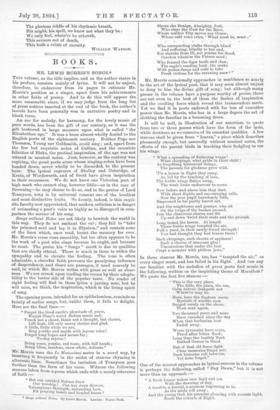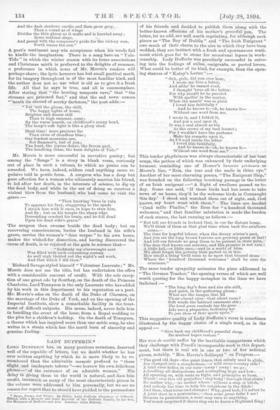BOOKS.
MR. LEWIS MORRIS'S SONGS.* Tars volume, as the title implies, and as the author states in his preface, consists mainly of lyrics. It will not be unjust, therefore, to endeavour from its pages to estimate Mr. Morris's position as a singer, apart from his achievements in other fields of poetry. And to do this will appear the more reasonable since, if we may judge from the long list of press notices inserted at the end of the book, the author's laurels have been generally won in narrative poetry and in blank verse.
An ear for melody, for harmony, for the lovely music of pure words, has been the gift of our century, as it was the gift bestowed in large measure upon what is called " the Elizabethan age." It was a boon almost wholly denied to the English poets of the eighteenth century. Neither Pope nor Thomson, Young nor Goldsmith, could sing ; and, apart from the few but exquisite notes of Collins, and the eccentric felicities of Blake, the poetical inspiration of the age was not uttered in musical notes. Just, however, as the century was expiring, the great poets arose whose singing.robes have been handed down, never wholly to be discarded, to the present hour. The lyrical raptures of Shelley and Coleridge, of Keats, of Wordsworth, and of Scott have given inspiration to their successors. We do not know one Victorian poet of high mark who cannot sing, however little—as in the case of Browning—he may choose to do so, and in the genius of Lord Tennyson, song is by universal consent one of the loveliest and most distinctive traits. IC keenly, indeed, is this exqui- site faculty now appreciated, that modern criticism is in danger of estimating a poet's voice so highly as to disregard in com- parison the matter of his song.
Songs without Notes are not likely to bewitch the world in this way. They do not enchant the ear; they fail to "take the prisoned soul and lap it in Elysium," and contain none of the lines which, once read, haunt the memory for ever. Mr. Morris's verse runs smoothly, but too often appears to be the work of a poet who sings because he ought, not because he must. The praise his " Songs " merit is due to qualities that are chiefly ethical. There is much in them to widen the sympathy and to elevate the feeling. The tone is often admirable, a cheerful faith prevents the paralysing influence of despondency, and there are passages, it need scarcely be said, in which Mr. Morris writes with grace as well as clear- ness. We are struck upon reading the verses by their adapta- bility to the better side of the popular taste. No reader of right feeling will find in these lyrics a jarring note, but he will miss, we think, the inspiration, which is the living spirit of song.
The opening poem, intended for an epithalamium, reminds us faintly of earlier songs, but, unlike them, it fails to delight. Here are the final lines :— " Forget the tired earth's plenitude of, years,
Forget Time's weird Eolian music sad; Touch not a chord, think not a thought, but cheers, Lift high, lift only merry strains and glad. A little, little while we are, Sing youths and maids with joyous voice ! Forget long hopes and issues far ; To-day rejoice !
Bring roses, youths, red roses, with full hands; Bring lilies, maidens, snow-white, delicate."
Mr. Morris uses the In Memoriam metre in a novel way, by inserting it frequently in the midst of stanzas rhyming in alternate lines. Sometimes the imitation of Tennyson goes further than the form of his verse. Witness the following stanzas taken from a poem which ends with a manly utterance of faith :— " But can unaided Nature draw
Our worship ? Can her stern decrees, Triumphant Strength, unbending Law, Fit praying hands and bended, knees ?
• Sono without Nam By Lewis Morris, Loudon: Kagan Panl.
Shows she Benign, Almighty, Just, Who slays the Unit for the Race, Whom neither Pity moves nor Grace; Whose cold voice cries, What must be, must . . ..... .
Who unregarding stalks through blood And suffering, blindly to her end, Nor shrinks from Ill, nor yearns for Good, Careless whate'er the Future send ; Who framed the tiger tooth and claw, The eagle's rending beak, the snake With poison-fangs and coils to take Fresh victims for the ravening maw ?"
Mr. Morris occasionally approaches in semblance so nearly to the art of the lyrical poet, that it may seem almost unjust to deny to him the divine gift of song; but although many poems in the volume have a purpose worthy of praise, there are not even in the best of them the flashes of inspiration and the exulting force which reveal this transcendent merit. Yet we find it in poets endowed with far less of executive power than Mr. Morris, who has in a large degree the art of clothing the familiar in a becoming dress.
It will be well, in illustration of our assertion, to quote from two or three poems which have the form of the lyric, while destitute as we conceive of its essential qualities. A few stanzas shall be given from "Icarus," a piece which describes pleasantly enough, but assuredly without musical notes, the efforts of the parent bird's in teaching their fledgling to use his wings.
" What a spreading of fluttering wings ! What chirpings, what pride in their child !. As forgetting terrestrial things, The parents for gladness grow wild.
'Tie a lesson in flight they essay, As, led by the teaching of love, The feeble wings flatter away, The weak limbs endeavour to move.
Now before and above him they dart, With short flights and encouraging calls, Now the poor pupil harmlessly falls, Engrossed in his partly learnt art.
And the neighbours and gossips, who sit On the twigs of the bushes around, Join the clamorous chorus and flit Up and down 'twixt their seats and the ground.
Long lasted the lesson. At length Those feeble wings tempted the air, Full a yard, in their newly-found strength ! You had thought they had Icarus there !
Such chirpings, such shouts of applause ! Such a chorus of innocent glee !
Unconscious that under the tree Crept a monster with pitiless jaws."
In these stanzas Mr. Morris, too, has "tempted the air," as every singer must, and has failed in his flight. And can any ear familiar with the melodies of great poets find music in the following, written on the inspiriting theme of Marathon P We quote the first five stanzas :- "This is the very place,
The hills, the plain, the sea, Calm nature changeth not Whate'er may be.
Here, hero the Eastern wave, Myriads of warlike men Surged vainly on the shore, Then sank again.
Two thousand years and more Have vanished since the day When that barbarian host Faded away.
Worse tyrannies have come, Flood after bitter flood; Long time the loathly Turk Bathed Greece in blood.
But of that old fierce fight Clear memories linger yet; Dark histories roll between, Yet none forget."
One of the nearest approaches to lyrical success in the volume is perhaps the following, called " Day Dawn," but it is not more than an approach:— "A fresh breeze wakes over land and sea
With the dawning of day, A trouble, a travail, a newness beginning to be As the mists roll away ; And the young God, his pennons glancing with roseate light, Routs the cohorts of Night. And the dark shadows curdle and then grow grey, Then a sound as of wings Divides the thin gloom as it melts and is hurried away ; Some sentinel sings, And proud with the conqueror's pride for the victory won, Forth issues the sun."
A poet's sentiment may win acceptance when his words fail to kindle the imagination. There is a song here on " Yule- Tide " in which the winter season with its home associations and Christmas mirth is preferred to the delights of summer, a preference in which some of Mr. Morris's readers will perhaps share ; the lyric however has but small poetical merit, for its imagery throughout is of the most familiar kind, and the author does not so use what is old as to give it a fresh life. All that he says is true, and all is commonplace. After stating that " the howling tempests rave," that " the streams are prisoned fast," and that the sad town cowers "'neath its shroud of murky darkness," the poet adds :— " Yet 'mid the gloom, the chill,
The happy lights of home, Brighter and dearer still Than in high summer, come; By the warm hearth, on childhood's sunny head, The lamp's soft light is like a glory shed.
Blest time ! more precious far Than skies of cloudless blue ; Our fondest memories are, Not Summer's, but of you; The feast, the joyous danco,•the frozen pool, The headlong chase, the keen delights of Yule."
Mr. Morris is more successful in narrative poetry ; but among the "Songs " is a story in blank verse, curiously out of place in such a volume, to which no praise can be awarded. We have, indeed, seldom read anything more re- pulsive told in poetic form. A surgeon who has a deep but pure affection for a woman who ultimately marries his friend, is led after her death, in the interests of science, to dig up the dead body, and while in the act of doing so receives a violent blow from the husband, who had come to visit the grave :— Then knowing 'twas in vain To appease his fury, staggering to the spade I struck him with it once, in hope to stun him, And fly ; but on his temple the sharp edge Descending crushed his brain, and he fell dead Upon his dead wife's grave."
'The surgeon then swoons beside the dead body; but on recovering consciousness, buries the husband in his wife's grave, carries the woman's " dear corpse " to his own home, makes the wished-for dissection, and having discovered the cause of death, is so rejoiced at the gain to science that- " Suddenly my o'erwrought soul Was filled with such consuming ecstasy As well nigh blotted out the night's sad work, And that which I did then."
Richard Savage styled himself " Volunteer Laureate; " Mr. Morris does not use the title, but has undertaken the office with a considerable amount of credit. With the sole excep- tion of one great ode by Southey, on the death of the Princess Charlotte, Lord Tennyson is the only Laureate who has added by his work in this department to his reputation as a poet. Mr. Morris's odes on the death of the Duke of Clarence, on the marriage of the Duke of York, and on the opening of the Imperial Institute, show a remarkable facility in the treat- anent of difficult subjects. His muse, indeed, never fails him in handling the event of the hour, from a Royal wedding to the plea for a children's holiday. On the death of Tennyson, a theme which has inspired more than one noble song, he also writes in a strain which has the merit born of sincerity and genuine feeling.



































 Previous page
Previous page